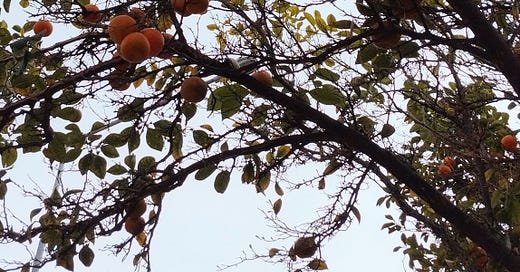Homerphilia: Late-autumn in Izmir
It's not quite a "winter wonderland" but it is beautiful and legendary.
The holidays are coming, along with a welcome break from school. On our last school day of the year, we have a winter carnival, and a part of this carnival is for a choir of teachers to sing.
This year we’ll sing, “Winter Wonderland.”
As I practiced, though, I kept thinking, “I’m singing about New England, USA, yet I’m here in Izmir where sleigh bells aren’t ringing — nor have they — and snow isn’t glistening in the lane.”
This directed my thoughts to winter in Izmir, and the first thing I thought of was rain.
Since mid-November, it has rained about three times a week — long, hours-long showers that march across the Aegean or roar down from the Black Sea in wide, towering fronts. It grows dark quite early, too, an effect made darker by the clouds.
And the wind. It bites as it blows in off the bay, cutting through layers of clothing. It is a chilly wind this time of year, not the welcome releif it provides most of the year.
Izmir is no “winter wonderland” — at least nothing like the holiday classic.
Then something occured to me the next day. I was walking home from the bus stop, unpeeling and enjoying a delicious tangerine. (I have written about these elsewhere.)
Of course. The thought struck me like a ray of light. The clouds must have parted for a moment. Izmir IS a wonderland in winter: I enjoy the sweetest tangerines (known here as mandalina) I could find anywhere.
A Homeric View
Later, I was reading from The Iliad with my Grade 11 students: Book 16 where Patroclus turns the tide of battle (my favorite book in the epic).
I read the following phrase, paused, and looked out the window.
And all in an onrush dark as autumn days
when the whole earth flattens black beneath a gale
up in arms, furious, storming against those men
who brawl in the courts & render crooked judgments,
men who throw all rights to the winds with no regard
for the vengeful eyes of the gods — so all their rivers
crest intto flood spate, ravines overflowing cut the hilltops
off into the lonely islands, the roaring flood tide rolling down
to the storm-torn sea, headlong down from the foothills
washes away the good, plowed work of men —
Rampaging so,
the gasping Trojan war-teams hurtled on. (The Iliad, 16.455-67)
Homer’s “autumn days” were described by a native of the coast where I now live. And while I haven’t experienced a gale like the one in a passage — I was probably hunkered down in my first-floor apartment — I know the sudden rains of late autumn all too well. Two weeks ago, I was riding my bike home from Alsancak when I got caught in one. I had nowhere to go but home, and I arrived soaked, despite my water-resistant coat.
The two paragraphs above should help to relate how lucky I feel to live and teach in Izmir. To be able to read passages from The Iliad or The Odyssey and then look out the window — or walk by the sea — and think, “Oh, so that’s what Homer meant.” It’s an amazing rush. And it happens two or three times a month.
What is late autumn like in Izmir?
I have provided two descriptions: one of my own and another by the greatest writer of all time.
And I will continue to search for more. It is a fun late-autumn pastime.
(I realize that I will publish this on the last day of autumn, December 20. I hope my readers are comfy and warm when winter arrives where you are.)



